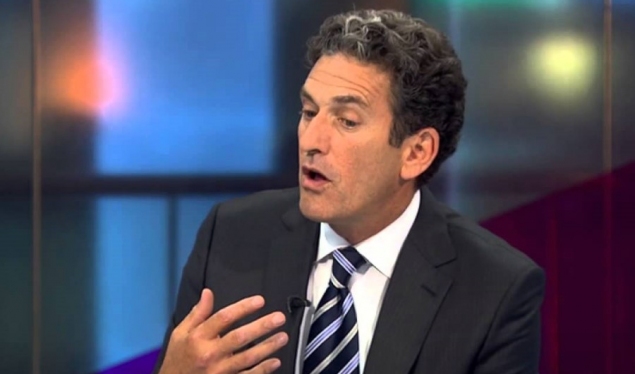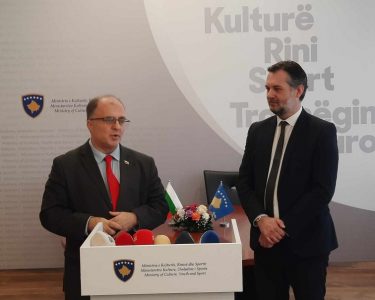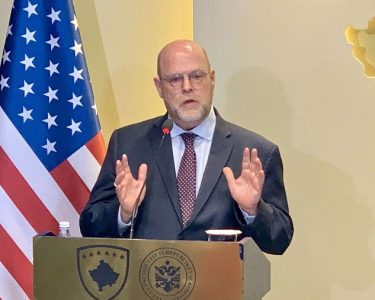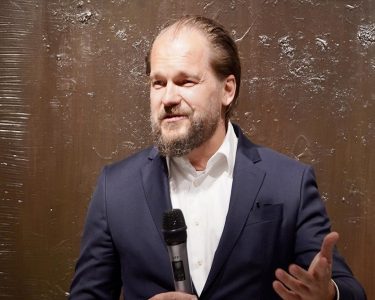In an exclusive interview with KosovaPress, James Rubin, one of the key international figures associated with the issue of Kosovo during 1998-2000, says that the relations between US and Kosovo remain strong, and the commitment to the security of Kosovo remains strong.
He also spoke about the efforts of the US administration to reach a peace agreement between Kosovo and Serbia and said that the international negotiations will require compromise, not compromise on principles but compromise on tactics.
Rubin commended President Thaçi for his decisions to support the Rambouillet Court, proved a brilliant historical move, because it brought the United States, and the West, and NATO on the side of Kosovo, and still led ultimately to the independence of Kosovo.
Full interview:
KosovaPress: Mr. Rubin, as a senior US official, you have been strongly associated with the issue of Kosovo, and recently there has been some kind of headache on the part of the US administration in relation to Kosovo. How do you see this situation?
James Rubin: There were some issues between the US government and Kosovo government, those were tactical questions, wether those trade sanctions were wise, not questions of security. So I think the relations beween US and Kosovo remain strong, and the commitment to the security of Kosovo remains strong. On the Kosovo side it’s more complicated, there is a split in the government between the President and the Prime Minister, there are those in the Prime Minister’s team and the Prime Minister himself, and the party that he represents, will never seem to understand that the international negotiations will require compromise, not compromise on principles but compromise on tactics. HashimThaci on the other hand had the wisdom back in 1999 to find a way to bring the west in support of the Kosovo people, and the people that were seeking their freedom without compromising the principles of independence, and his decision to support the Rambouillet Court, proved a brilliant historical move, because it brought the United States, and the West, and NATO on the side of Kosovo, and still led ultimately to the independence of Kosovo. So, his wisdom and understanding of how sometimes tactics and timing require compromises, but the commitment to the long term principles don’t require compromise, that unique understanding, he has shown he has, while others in the Kosovo political scene seemed to be dreamers, they think they can ask for everything and get everything without compromise, that is not sophisticated, nor is it good for the people of Kosovo, because they’re led down a path that puts them always in the situation of having their hopes and their expectations dashed, and their ability to get progress prevented.
KosovaPress: While 20 years ago in the American political and diplomatic scene there were other leaders and it seems with a softer approach to Kosovo, while at least on the Kosovar side is still Mr. Thaqi the main man in the negotiation process, does this seem positive for Kosovo, if we count on the experience of Mr. Thaqi?
James Rubin: So, I think HashimThaci is great a choice for negotiating an issue like this, he understands the problems, he’s been there for the last twenty years, and if I were a Kosovar Albanian I would feel great confidence that he’s involved, but I’d be concerned that he doesn’t have the political support of all the other political constituencies, who again seem to think they can get their dreams fulfilled without doing the hard work or making the compromises that real politique and the real world require.
KosovaPress: Do you think that Kosovo’s leaders are to be afraid of the accelerated dynamics when it comes to the talks with Serbia?
James Rubin: What the Kosovo leaders should be concerned about is making clear that an agreement with Serbia is not sufficient to achieve the objectives, and no major compromises should be made unless there is confidence that what Serbia does will lead to Russia removing it’s veto of Kosovo’s membership in the United Nations. The key question here is whether Kosovo could become a normal country, whether can it be removed from the waiting room of history, and return, and join the community of nations. That can only happen with the acquiescence of Moscow and the acquiescence of Serbia, there is no other way. And, so what I’d be concerned about is not the speed of the talks but the fact that there would be insurances that the whole package would be put into place, unless Russia were part of the solution, unless Russia would put on the spot, being the only country that was preventing progress. If Serbia wants to move forward in the history of Europe, to become part of the European community, to become a part of Europe in general, they now they have to compromise. But that is not enough, it’s gotta be clear that even a Serbian compromise have to include Russia’s acquiescence, in order for Kosovo to make serious compromises.
KosovaPress: According to you, how is Ambassador Grenell managing the whole situation between Kosovo and Serbia?
James Rubin: Well, I don’t know him personally, I’ve never met him, I’ve observed his process in my professional capacity, look, he’s… individual, he gets mixed reviews from many different people, some people like him, some people don’t. I think what matters is what the actual substance of negotiations is, a lot more than the personalities involved, and I think what matters here more than anything is whether the West, and the United States, and the Trump administration, and the Ambassador Grenell have a program for getting us from here to there, meaning, can they assure the Kosovar leaders that there will be a process, not only of compromise on border adjustments, compromise on the final settlement issues, but also a process to insure that Kosovo can join NATO, Kosovo’s in a position to join the United Nations, and that the US is able to bring in at the appropriate time the government of Russia, and other relevant governments, so what’s done at the negotiating table can be translated into what Kosovo needs, which is membership in the United Nations, and joining the international community as a full member in a good standing, and that is a complex diplomatic set of objectives, and it requires a careful timing and careful assurances from the government of Russia, the European governments, other members of the United Nations, as well as the Serbs and the Kosovars, therefore it requires diplomatic leadership, that’s what the issue is, not so much the particular personality of the person who’s been the face of the talks for the United States.
KosovaPress:Do you expect that The White House will result successful in it’s efforts to persuade the parties to reach an agreement before the elections in November?
James Rubin: I don’t know. I think that’s a tall order, to get this issue solved in a few short months. It’s been something that has been set aside for couple of years now because of differences in the West. Hopefully the two leaders have been able to informally work on some of the problems. I’m not worried that the enthusiasm of the Trump administration will lead to unnecessary compromises, what I’m only worried about, is that Serbia understands, that without bringing its sponsor in Moscow, the Putin government along, that they cannot achieve their goals of joining the European community, it’s not enough to have Serbia make compromises and join the European Union or make a commitment to join the European Union, it has to include bringing the Putin government along, that for me is the big unanswered question, and certainly it is not a question of timing, because President Putin needlessly made Russia join the side of the countries that are opposing progress in Europe, and he can easily switch that if he sees that he’s the only obstacle, so it is not a question of timing, it’s a question of political will. And that requires a lot of diplomacy, a lot of high level negotiations, but I think it could be done, theoretically, will it be done… It’s hard to predict that you could fix all the problems remaining in the Balkans in a few short months, but could you set the stage for it, could you create the kind of break through that allow to be done in the future, with all the elements being put in place now, that’s possible, a framework agreement of some kind, could be implemented over time. And certainly, the hard negotiations will be the ones between the president of Kosovo and the president of Serbia, and to the extent they’ve been able informally to think these things through, and to think about the trade offs necessary, it’s certainly possible, because implementation could be delayed and phased over time. I want the people of Kosovo to have a bright future, and they won’t have a bright future so long as Serbia blocks progress, and Russia prevents them from joining the United Nations and being a normal European country, so these are realities that can’t be fixed through dreaming, through being opponent of everything, for being a person who thinks you can solve these problems just by wanting to solve them, it has to be done through the hard work of diplomacy, not through the dreaming and imagining of idealists who’ve never achieved anything other than becoming popular .
KosovaPress: If the democrats were in power in the United States, do you think they’d have a different approach towards this issue?
James Rubin: Not really, I think that a creative democratic administration would understand that the problem remains the same, how do you get the Serb government to make a big compromise, to make a change in the position that’s been at the core of their ideology and their nationalism for hundreds of years, to do that you have to give something up, that’s a simple truth of the international diplomacy. So, I think the Democratic Administration would understand that too, were it would be different, and this is important, is that it would be much more concerned in developing a unified stand of the West, so that it could maximize the chances of getting the Serbs to make a compromise on a big issue, and maximize the chance that the Russian government would be willing to allow Kosovo into the United Nations, I think the more unified the West is, the greater the chance of getting what Kosovo needs, which is Serbian compromise and Russian acquiescence, and Kosovo becoming a normal country, the more unified the West is, the better the chance that can happen. But it doesn’t mean it can only happen through a unified West, maybe it can happen without that, and we’ll find that out in the next few months.
KosovaPress: Who do you think prompted the idea of exchanging territories, and do you suppose that the Trump administration will support such a solution?
James Rubin: I think, in previous years the president’s advisors have indicated that they can agree to what the two parties can agree to, so if the two parties can agree to a set of trade offs that yields, and this is crucial, a final settlement, making border adjustments, just for the sake of border adjustments,is not worth doing. It is only worth doing, or even considering as a part of a package that ends the conflict. Imagine how different Kosovo and Serbia would be to Israel and Palestine, to Armenia and Azerbaijan, to the many unending conflicts around the world, where the final settlements just never gets done, to Cyprus, or whether there’s Turkish and Greek disagreements, there are many examples of frozen conflicts, take the country of Georgia there are examples, that is not the future I want for the people of Kosovo, to be part of a frozen conflict. So, being open to creative diplomatic solutions that may include border corrections and border adjustments, seems to me sensible and practical, because it recognizes how hard this will be for Serbia. But the Trump administration has said that they can agree to what the Kosovo government and the Serbian government can agree to, and I think that’s a sensible position, why should the United States be more, as they say, holy than the Pope. It’s Kosovo’s people future that’s at stake, it’s the people of Kosovo territory that might involve border adjustment, not the United States’, so long as the agreement yields the long-term security for Kosovo that we need not just for the people of Kosovo, but for the continent of Europe, and that includes normalizing relations between Kosovo and Serbia, and normalizing relations between Kosovo and the United Nations, and that will achieve a long-term stability for Europe that was only have been dreamed of in the past, if that is the end point, I’m less worried about the technicality of border adjustment than some of my colleagues in Europe who seem to think that’s the only issue that matters, and don’t seem to have any alternative solutions. It’s easy to be a critic, to say that some agreements are not good enough, or some idea is too risky, but if you don’t have an alternative solution, you don’t have a path for Kosovo’s membership at the United Nations, and you just say that some agreement isn’t good enough, I don’t think you’re being very constructive, and to many Europeans seem to think that this is a precedent for some other conflicts. I’ve learned over the years that this idea that what happens between Kosovo and Serbia will dictate what happens between Azerbaijan and Armenia, or the Turks and the Greeks, or any other country, is usually non sense, almost every situation is different, and there’s no cookie cutter solution to these problems, what you have to do is look at the set of problems, see what’s plausible, whether there are long term games to be made, see if the trade offs make sense, and then ask yourself, what is best for you ally, and in this case, the ally is the people of Kosovo, and I think if the people of Kosovo decide that this is a path that they can take, through some referendum, who are we in the West to say that the path is so dangerous to some others conflict. I think that is arrogant and extremist, to believe that we know better than the people of Kosovo what’s good for them in terms of border adjustments. If they get a normalized international situation and they get their membership in the United Nations, and they have to make some modest border adjustments, and they vote in favor of it, I can’t imagine why a German diplomatic official knows better, and that is what I think.
KosovaPress: One last question. We assume that you’re still in contact with the former US leaders, President Clinton and secretary Albright, would you mind telling us all the views of all of you who have been so deserving of Kosovo’s freedom, if you are concerned or optimistic about the epilogue of the negotiations?
James Rubin: I was recently a lobbyist for the President of Kosovo, registered lobbyist, I stopped doing that at the beginning of April, so now I’m not, now I’m just a free agent. But during the time that I’ve worked with the Presidency and HashimThaci, I’ve worked with him to ensure that he was in very close contact with not only the Republican administrations and Presidents from the past, like George W. Bush, but also President Clinton, and Secretary Albright, so I know that he was able to talk to them about these issues and this concept of finding a way to bring the final status and the final settlement to success for Kosovo. I know that he spoke to President Clinton extensively about this, and the same with Secretary Albright. I wouldn’t want to speak for them because that’s not my job anymore, but I could say that President Clinton in particular was very supportive of the effort that he was making, and I think he, and the former President George W. Bush was also supportive, and both of them wanted to find ways to help him to achieve final settlement for Kosovo and for the people of Kosovo to make a normal country, and I’ve never heard any expressions of extreme concern about the path that President Thaci was taking, on the contrary, I think that President Clinton in particular seems to want to help, and so that’s what I can say about that.
The interview was conducted on Monday.








